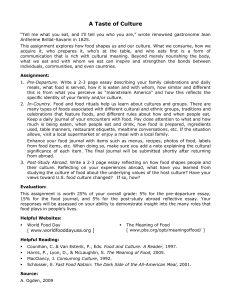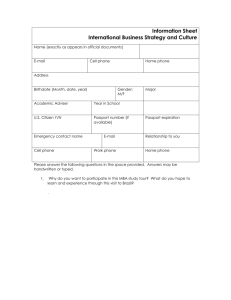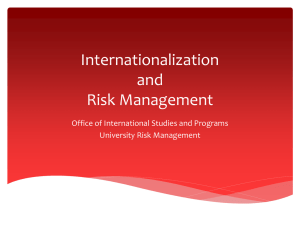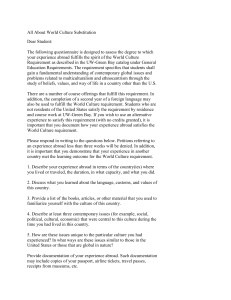Summer Orientation Presentation
advertisement
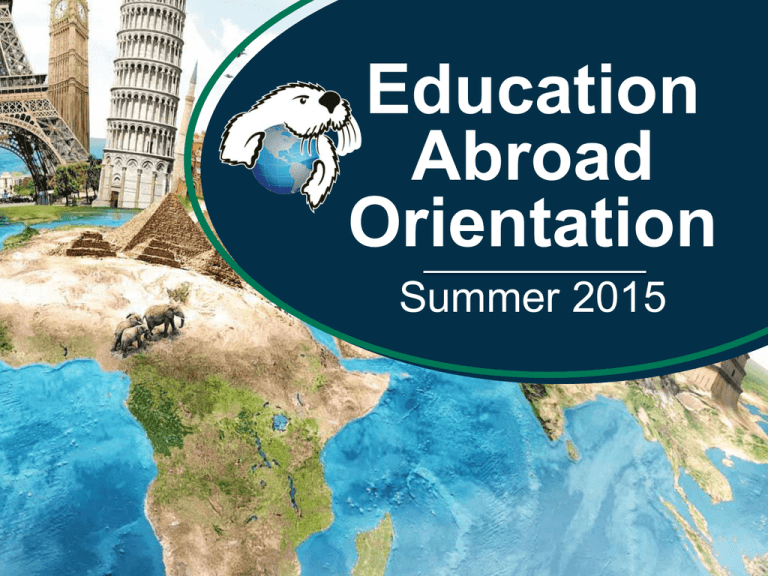
Education Abroad Orientation Summer 2015 Presentation Topics • • • • • • • Pre-Departure Planning Safety Health Abroad Laws Abroad Register for STEP Money Matters Getting There Presentation Topics • Communicating with loved ones • Advise from Alumni • Packing Pre-Departure Planning The key to traveling safely is: PREPARATION! • Research your country • The US State Department is the best place to find information about your host country. • GET A GUIDEBOOK! Learn a few phrases in the language of the country Travel Mantra #1: Know where your embassy is! Pre-Departure Planning Your Insurance Company: Trawick International For Claims and questions: http://students.trawickinternational.com/ CSUMB SCHOOL ID: 95 Toll free: 877-916-7920 • Email: claims@gbg.com Pre-Departure Planning • Have copies of the following with you in a secure location separate from the originals: – PASSPORT: This is the MOST IMPORTANT document you will have with you! A person without a Passport is a person without a country! – Insurance Card – Flight Information – Contact information for bank/credit card Pre-Departure Planning • Leave copies of the following with your primary emergency contact in the U.S.: – – – – – Identification documents (Driver’s License, Passport, etc.) Insurance Contacts Medical Information Flight Information Your contact info while abroad & contact information for bank/credit card Important Information Upon Arrival & Throughout Your Stay • Find the nearest U.S. consulate – travel.state.gov • Visit the website for the State Department & Center for Disease Control (CDC) frequently to check for Travel Warnings and Public Announcements: travel.state.gov & www.cdc.gov • Keep your study abroad/health insurance current for the entire time you are away (i.e., if you extend your stay, be sure to extend your insurance policy until the date you return) – Very Important • Please check your e-mail daily or as often as possible, in case we are trying to reach you. If your e-mail address changes, let us know immediately. Safety • Remember to register your travel plans with the US Embassy. It’s fast and easy! • The US Department of State – provides the most accurate and current information about your host country as well as helpful information for US citizens abroad. • Though airports are full of security, you still need to watch your luggage at all times. • Prepare a personal Emergency Action Plan (EAP). – Writing down what you will do in an emergency before an emergency happens can save you time and help you deal more efficiently with an emergency situation. Safety • Don’t travel alone at night or on long trips. • Don’t invite strangers to your room. • Notify someone of your travel plans. – Tell them your expected travel dates, arrival, and return times. • Register all side trips with STEP • Excessive drinking can be an invitation for disaster. – If you are drunk, you are more likely to become a crime victim. • Feel free to email or call us if you think we can be of assistance, but remember that we are thousands of miles away and may not be able to respond as quickly as you need. Safety The U.S. Embassy WILL NOT: • • • • Serve as a travel agent Act as an interpreter Get you out of jail Arrange free medical or legal service Safety Tips to keep your laptop and private information safe • Limit personal data to what is needed for travel purpose • Encrypt and/or password protect data • Back up all data before leaving home • Ensure antivirus software is current and working properly • Ensure all software patches are applied Safety Tips to keep your laptop and private information safe CELL PHONES CONTAIN: Signs your phone was cloned: • • • • • • Personal data, bank and credit card account information Intellectual property Calendar information GPS – Geotagging – photos can give away your location – • • Do not post photos on Facebook while traveling A unique factory setting serial number Scam artists can reprogram (clone) phone to charge calls and texts to your bill • • • Phone calls and texts not received Incoming calls go straight to voicemail Cell phone battery suddenly drains Do not allow strangers to use your cell phone Consider purchasing disposable cell – provide phone number Health Abroad • Check the Centers for Disease Control (CDC), The World Health Organization (WHO) and the US State Department for the most up-to-date information regarding health issues and/or vaccination requirements in your host country. • Meet with your physician before leaving the US. • If you take prescription medications, make sure you have a sufficient supply to last you for the entire time you are abroad. It may be a good idea to have a copy of the prescription with you Health Abroad • Anticipate your health requirements. If you have an allergy to something, be sure to communicate that with your host family/program provider. • Practice “common sense” health habits: safe sex, washing your hands, going to a doctor if you feel flu-like symptoms, etc. Laws Abroad • You are bound by the laws of the country to which you are traveling. • Drug abuse will NOT be tolerated and could land you in jail. • Drinking, while perhaps an important part of the local culture, is oftentimes subject to the same laws and restrictions as in the U.S. • Alcohol abuse in any country is a recipe for disaster. • If you find yourself in jail, CSUMB will not be able to assist you. – Even the US Embassy in your host country may have limited authority to assist you. STEP Smart Traveler Enrollment Program • • Whenever you travel outside the U.S. you should register your information online in the U.S. State Department STEP program. This will allow U.S. Embassy staff to send you security updates and information about the countries you are visiting and to locate you in case of a natural disaster or other emergency. STEP Smart Traveler Enrollment Program • • • • • • Go to step.state.gov/step/ Create an individual account and log in Fill out profile information Fill out trip dates and locations You should receive confirmation email You will receive updates and warnings from the nearest consulate Money Matters • “Don’t put all your eggs in one basket! Carry a combination of a debit card, credit card and cash/traveler’s checks. Consult your bank for the best way to use money abroad. • ATMs generally work just fine everywhere in the world. If you’re not sure if ATMs are readily available in your host country, ask your bank for advice. • Don’t carry a large amount of cash on you at one time. Take out only what you need for a day; you can always get more later. Money Matters • Call your bank and credit card companies to alert them that you’ll be traveling abroad. Make sure you can increase your withdrawal limit should you need to use your credit card for an expensive emergency. • Be sure you understand your currency conversion rates or bank fees associated with overseas withdrawals and consider changing a small amount of money before you leave (most banks can do this). Money Matters • Before you go, figure out how much money you will need for incidentals not included in your program fee. • Research your host country’s and city’s costs of living and exchange rate. • You can check daily exchange rates for your host country online at oanda.com or xe.com. • Determine how you’ll be spending money abroad — consider cost of entertainment, restaurants and regional travel. Getting There by Air • CSUMB study abroad participants recommend the following sites for discounted airfares: – – – – – – – – • www.studentuniverse.com www.sta.com www.mobisimo.com www.kayak.com www.sidestep.com www.vayama.com www.flycheapo.com www.cheapoair.com Around the World Tickets (ATW) – – Most American students are unfamiliar with ATW tickets, but it is worth looking into If you are planning on doing some major traveling. Most ATW tickets will grant you a full year to travel to three or more continents and can be quite reasonable in comparison with the price of other tickets. Requirements for Entering Your Host Country • • • • • Passport Student Visa (Not needed for summer) Round-trip Itinerary Proof of Housing Proof of Adequate Finances Communicating with Loved Ones in the US • Technology is a great tool to keep in touch with loved ones back home while you’re abroad. However, be careful not to spend so much time communicating with loved ones back home that you are missing out on great experiences in your host country. • Social media is an easy way to stay connected with your loved ones. Be careful not to spend too much time on social media, as it limits your opportunity to connect with your host culture and may increase homesickness. • Web and smartphone apps such as Google Hangout, Skype and Facetime make it easy to video chat with friends and family in the U.S. for free. • Other apps such as WhatsApp and Viber are also popular choices among students. Communicating with Loved Ones in the US • Stay connected and be open-minded – – – – – Share your stories with those at home to put new experiences in perspective Keep contact with home in check; find time for new friends abroad Respect the communication conventions of your host culture Seek help locally if you need it Make a record of your thoughts and feelings to help you reflect Communicating with Loved Ones in the US • As you go through the cultural adjustment, you will have to find a balance between communicating with loved ones back home and finding your place in the host location. • Be strong! You can make it just fine in your new surroundings! Advice from Study Abroad Alumni • • • • • • • • Be flexible; do not have too high of expectations – everything won’t be perfect Keep an open mind & be prepared to learn Get out, make friends, & learn the language. Do not hang out only with Americans! Take time to adjust in the new environment Budget for souvenirs for yourself, family, or friends. Control your temper. Do not go if you’re going to complain about how much you hate the host country. If you choose to drink, do so reasonably: your drunken stupor will reflect badly upon yourself, CSUMB, and America as a whole. Packing Travel Mantra #2: Pack Lightly! When planning your travel, not only do you have to leave your emotional baggage behind, you also need to leave non-essential items at home, too! Packing YOU and ONLY YOU are responsible for your luggage. Don’t take more than you can carry! Don’t pack anything you don’t want confiscated. Don’t forget prescription meds! Keep all prescription and over-the-counter medications in their original containers. Know your airline’s baggage restriction policy (weight, liquids safety, extra charges, etc.) Packing Have a plan for bringing back those souvenirs. (You really do not have to buy something for everyone!) Believe it or not, clothing, laundry facilities, soap, shampoo, and other toiletry items are readily available in just about any country. – There might be something you can pick up once you arrive so that you can lighten your load now. Although unfashionable, a broken-in pair of sneakers is your best friend. New shoes mean blisters and a BAD start to your trip! As the Scouts say: “Be Prepared!” Take a small first-aid kit along with you. Packing Remember: 3-1-1 Airline guidelines for carry-on luggage: – – – 3.4 ounce bottles for liquids 1 quart-sized clear plastic, zip-top bag 1 bag per passenger placed in a screening bin Safety, Health & Emergency Everything in one spot…. http://studentsabroad.state.gov/ – – – – – – Lost or Stolen Passports Visas Emergencies Health Emergency Embassies Stay in Touch GOOD LUCK! Thank you for completing this Pre-departure Orientation. We hope you have a safe, healthy and thoroughly life-altering experience while away from CSUMB. As always, should you have any questions, issues, concerns, want to vent, or simply want to brag about being outside the U.S., don’t hesitate to contact us! RESOURCES Government Websites • Department of State travel information for students: studentsabroad.state.gov • Department of State travel registration: step.state.gov/step • Passport services and information: travel.state.gov/content/passports/english.html • Foreign embassies in the U.S.: state.gov/s/cpr/rls/fco • Foreign entry requirements: travel.state.gov/content/passports/english/country.html • Department of State travel warnings: travel.state.gov/content/passports/english/alertswarnings.html • Overseas Security Advisory Council: osac.gov • Centers for Disease Control and Prevention: cdc.gov RESOURCES Culture and Travel Websites • • • • • • • • What’s up with culture?: pacific.edu/sis/culture Lonely Planet: lonelyplanet.com Exchange rate information: oanda.com & xe.com Electrical outlets abroad: electricaloutlet.org Student Universe: studentuniverse.org STA Travel: statravel.com Worldwide hostel listings: hostels.com Hostelling International: hihostels.com Thank you!




